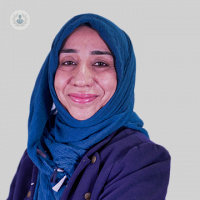Perineal trauma and childbirth: Expert insight on treatment
Written in association with:In this informative guide, revered consultant obstetrician and gynaecologist Ms Sameena Muzaffar sheds light on the short and long term effects of perineal trauma sustained in childbirth, and answers commonly asked questions, including how this type of injury is managed and treated. The leading specialist also shares expert insight on whether future vaginal deliveries are possible for women who have sustained perineal trauma.

What is perineal trauma?
Perineal trauma refers to the tearing of the perineum during childbirth.
What are the short-term and long-term effects of perineal trauma?
The effects of perineal trauma depend on the degree of the injury. If it's a first or second-degree tear that doesn't involve the muscles of the back passage, you might experience pain and discomfort for up to six weeks. Your sutures may break down, prolonging the healing process and potentially leading to infection. This might result in pain during bowel or bladder movements.
If you have trauma that involves muscles of back passage (third degree tear), you may have bowel problems in addition to above. You may need to rush to open your bowels and you may not have good control on faeces and flatus.
Will I be able to have a future vaginal delivery?
Whether or not you'll be able to have a future vaginal delivery depends on the type of tear you have sustained and how you feel. Your midwife and doctor will discuss delivery options. However, the majority of women who experience perineal trauma can go on to have a normal vaginal delivery in the future.
How is perineal trauma treated and managed?
After delivery, a midwife or doctor will examine the area and suture the perineal trauma to facilitate healing.
What other support is available?
Postnatally, a midwife will conduct a check-up. If any concerns arise, the midwife may request a doctor's review. In the case of a third-degree tear, a follow-up appointment will be scheduled to monitor healing and recovery. Additionally, you'll be referred to a physiotherapist for pelvic floor exercises.
If you wish to schedule a consultation with Ms Muzaffar, visit her Top Doctors profile today.


